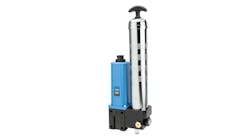The motor oil and other lubricants you select for your fleet vehicles play a vital role in reducing operating costs. Unfortunately, many maintenance managers still focus on the initial price per gallon when purchasing lubricants.
Paying a few dollars less per gallon of motor oil, for example, seems lucrative on the surface, but over the long haul, a higher-quality synthetic motor oil can make up the difference in initial price.
Field studies, laboratory testing and countless miles of real-world service have conclusively established the ability of synthetics to reduce costs by delivering the following benefits:
- Reduced wear.
- Reduced oil consumption.
- Increased fuel economy.
- Extended drain intervals.
Reduced wear – Synthetic lubricants are engineered to contain pure, uniform molecules. They form a durable lubricant film that helps separate metal components and resist wear.
By withstanding extreme temperatures and controlling friction more effectively than conventional oils, synthetics promote long-lasting equipment. During cold starts when most wear occurs, synthetics remain fluid to circulate and deliver almost immediate lubrication to critical engine parts.
The result is your equipment stays in service longer, maximizing profitability.
Reduced consumption – Synthetics’ pure, uniform molecules also help reduce the amount of oil that slips past the piston rings and burns in the combustion chamber.
Conventional oils contain a mixture of molecules of different sizes. The smaller molecules find their way past the rings much more readily.
Additionally, synthetics offer improved resistance to shear, which means the oil maintains its viscosity longer. Conventional oils that lose viscosity can lead to increased oil consumption.
You may have experienced this phenomenon with an engine that uses oil and must be topped off frequently. In fact, the average over-the-road semi consumes one gallon of motor oil each month, which can grow costly.
Synthetic lubricants feature thermally stable formulations that naturally resist volatilization, reducing frequent top-offs.
Increased fuel economy – The advanced lubricity of synthetic lubricants results not only in enhanced wear protection, but increased fuel efficiency as well. With less resistance to internal moving parts, engines are able to operate at peak efficiency and deliver maximum mpg.
Amsoil has conducted multiple industry-standard tests that demonstrate the ability of its synthetic lubricants to increase fuel efficiency compared to conventional lubricants, whether in short- to medium-haul trucking applications or stop-and-go city driving conditions.
Extended drain intervals – Fleet managers who practice extended drain intervals not only spend less on lubricants, they realize the benefits of maintenance personnel spending fewer hours performing lubricant service and increased time engaged in more profitable work. Synthetic lubricants resist breakdown better than conventional oils, allowing fleet managers to safely extend drain intervals.
A well-formulated synthetic motor oil contains premium synthetic base oils and a superior additive package – both key elements in the oils’ ability to function, hold up under engine stresses and remain serviceable for the full recommended drain interval.
FEWER EMISSIONS
Synthetics also offer the benefits of reduced emissions. Synthetics resist volatilization better than conventional oils due to their improved resistance to extreme heat.
Hot ambient temperatures or increased operating temperatures when towing or hauling can cause the light, unstable molecules in conventional oils to boil off. When conventional oils volatilize, they leave behind performance-robbing engine deposits that increase oil viscosity, leading to reduced fuel efficiency since the thicker oil is more difficult to circulate.
Volatilization also increases harmful exhaust emissions that exit the tailpipe and contribute to air pollution.
Though it may be tempting to save a couple bucks up front and purchase conventional lubricants, time and again synthetics have proven to be more cost effective over the long run.
Spend a little more now, and save a lot later.
Mark Nyholm is product manager, heavy duty for Amsoil (www.amsoil.com), a company that specializes in developing premium synthetic lubricants, fuel additives and filtration products. Amsoil lubricants are formulated, blended and packaged in the USA.



